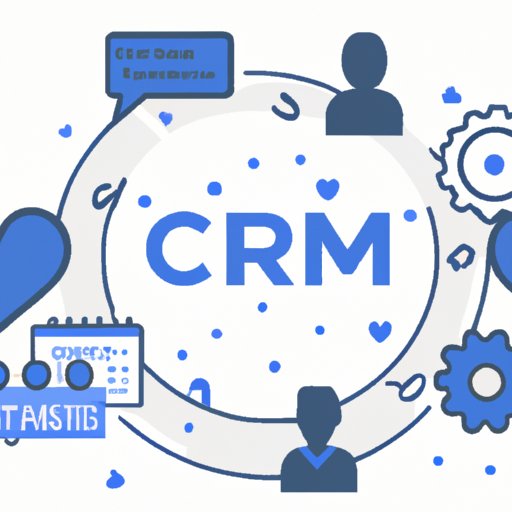Introduction
Customer Relationship Management (CRM) is a powerful tool that can help businesses build relationships with their customers, streamline communications and operations, and improve customer service. It is a software-based solution that allows companies to store and manage customer data, track customer interactions, and leverage customer insights to make informed decisions about their business. By utilizing a CRM system, businesses are able to gain a better understanding of their customers and improve customer satisfaction.
Improving Customer Service with CRM
CRM systems allow businesses to better understand customer needs by collecting customer data and tracking customer interactions. This data can be used to develop targeted marketing campaigns, customize product offerings, and provide personalized customer service. By leveraging customer data, businesses can create a better customer experience and increase customer loyalty.
CRM systems also enable businesses to automate customer service processes. Automation helps streamline operations and reduce manual labor, which can save time and money. Automation also makes it easier for businesses to respond quickly to customer inquiries and complaints, as well as provide timely follow-up. By automating customer service processes, businesses can ensure that customers receive prompt and accurate responses.
In addition, CRM systems allow businesses to collect and analyze customer data. This data can be used to identify trends in customer behavior, predict future customer needs, and tailor products and services to meet those needs. By analyzing customer data, businesses can better understand customer preferences and make informed decisions about their business.

Best Practices for Implementing a CRM System
When implementing a CRM system, it is important to have a clear plan and timeline. This will help ensure that the implementation process runs smoothly and that goals and objectives are met. It is also important to establish team roles and responsibilities so that everyone understands their role in the implementation process. Finally, when choosing a CRM software solution, it is important to consider the features and functionality of the software and how it aligns with the needs of the business.

Measuring Success with a CRM System
Once a CRM system has been implemented, it is important to measure its success. One way to do this is by setting key performance indicators (KPIs) that measure the effectiveness of the system. KPIs should include metrics such as customer satisfaction, sales revenue, and customer retention rate. Gathering feedback from customers is another way to measure the success of a CRM system. By gathering customer feedback, businesses can learn what customers like and dislike about the CRM system and make improvements as needed.
Finally, businesses should analyze customer data to determine the effectiveness of their CRM system. By analyzing customer data, businesses can identify trends in customer behavior and adjust their strategies accordingly. By taking the time to measure success and analyze customer data, businesses can ensure that their CRM system is working as intended.

Challenges of Adopting a CRM System
Adopting a CRM system can come with a number of challenges. One of the biggest challenges is the cost of implementation. CRM systems can be expensive to purchase and implement, and businesses must factor in these costs when deciding whether or not to adopt a CRM system. Additionally, user acceptance of the system can be difficult to achieve. Employees may be resistant to change and need to be trained on how to use the system. Finally, there is a potential for data security risks if the system is not properly secured.
Popular CRM Software Solutions
There are a variety of popular CRM software solutions available on the market. Salesforce is one of the most popular CRM systems, offering a suite of products designed to help businesses manage customer relationships. Microsoft Dynamics 365 is another popular CRM system that provides a comprehensive set of tools for managing customer data and interactions. Oracle CX is another popular CRM system that enables businesses to collect and analyze customer data and create personalized customer experiences. Lastly, Zoho CRM is a cloud-based CRM system that provides powerful features for managing customer relationships.
Conclusion
Customer Relationship Management (CRM) is an invaluable tool for businesses to improve customer service, automate customer service processes, collect and analyze customer data, and measure success with a CRM system. When implementing a CRM system, it is important to have a clear plan and timeline, set goals and objectives, establish team roles and responsibilities, choose the right software, and measure success with KPIs and customer feedback. There are a variety of challenges associated with adopting a CRM system, including cost of implementation, difficulty in gaining user acceptance, and potential for data security risks. Popular CRM software solutions include Salesforce, Microsoft Dynamics 365, Oracle CX, and Zoho CRM. In summary, CRM systems offer a number of benefits to businesses, but it is important to consider the costs and challenges associated with adoption.
(Note: Is this article not meeting your expectations? Do you have knowledge or insights to share? Unlock new opportunities and expand your reach by joining our authors team. Click Registration to join us and share your expertise with our readers.)
